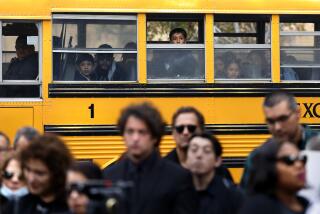The Wonder Years : Some ‘Pompous Assumptions’ About Teens Draw Zingers and Stinging Replies
- Share via
IN A RECENT column I deplored the disappearance of wonder, which Carl Sagan had called “the propelling force of science.”
I quoted him as saying: “It’s a very powerful emotion. All children feel it. In a first-grade classroom everybody feels it; in a 12th-grade classroom almost nobody feels it, or at least acknowledges it. Something happens between the first and 12th grades, and it’s not just puberty.”
I agreed, adding: “It isn’t so much that they don’t wonder but that they don’t want to acknowledge wondering. Not to know the answers is a sign of inadequacy, and no teen-ager will admit to inadequacy. It is almost impossible to get teen-agers to admit they are interested in anything but themselves, their closest friends and their idols, and it is hard to get them to admit there is anything they don’t know or need to know.”
Teen-agers are a minority, and if I had written so disparagingly of any other minority, the roof would have fallen in. But I thought few teen-agers would read my column, to begin with, and if they did, they wouldn’t care.
But Carole F. Shakely, who teaches alternative-program English at North High School in Torrance, required her senior class to read it and comment. She thinks some of their answers are interesting.
So do I.
Student Burt Green rightly accused me of stereotyping teen-agers. “First of all, I think Jack Smith is criticizing teen-agers and compacting teen-agers into a stereotyped, non-interested bunch of human beings who are not important. And I’m going to pay his Social Security? (He says) ‘It isn’t so much that they don’t wonder but that they don’t acknowledge wondering.’ I want some proof if I am going to have to hear this. Not everyone thinks and feels the same. (He says) ‘Today’s teen-agers may not be moved to wonder since they are instructed in everything by their peers.’ Here are more pompous assumptions about every teen-ager being peer-pressured by his friends. This man needs a lobotomy. I am amazed by his accusations about teens and wish he’d lose all his hair, but it looks like he already has.”
Not quite. I have sort of a Douglas MacArthur carpet up there. It’s white, though, which is an unpromising sign.
“I wish Jack Smith hadn’t stereotyped teens,” he concluded. “Let him say ‘some’ teens. What about the positive kids who aren’t mentioned at all in his article?”
I can only concede that I was generalizing, and in any generalization exceptions are implied. Thanks to a provocative teacher I have aroused a response in one group of teen-agers, at least.
As long as they can get angry at me, that proves they aren’t wholly absorbed in their peers. I have their attention.
I think Mr. Green’s indignation is justified on another count. As the Supreme Court has recently ruled, teen-agers have no right of free speech.
I would hate for Mr. Green or any of his fellow students to think that I agree with this censorial opinion, or that I was picking on teen-agers because I felt safe from any backlash.
I would love to see myself vilified in student newspapers. I would expect them, however, not to exceed the truth. I do have hair.
I am pleased that some of Mr. Green’s fellow students were moved, not to anger, but to wonder.
“The article was really good,” wrote Allan Park. “I liked it because I don’t really wonder too much anymore. I do wonder like how the moon has effect on the waves, how there is gravity on earth, why do stars fall, where does the water in the ocean go when the tide goes down, and where does it come from when the tide is up.”
“I agree with the article,” wrote Gina Seely.
“We do stop wondering about things after so long. Our minds tend to dwell on what is in front of us at the present time.”
Claudine Cababa wondered, “Is there really a God, or is the Bible wrong and evolution right?
“Is there a twin earth out there somewhere? What would I be like if I was white and not Oriental?
“I wonder what the world will be like a hundred years from now; how good a mother I’ll be.”
Maybe everything will be OK.
More to Read
Sign up for Essential California
The most important California stories and recommendations in your inbox every morning.
You may occasionally receive promotional content from the Los Angeles Times.













